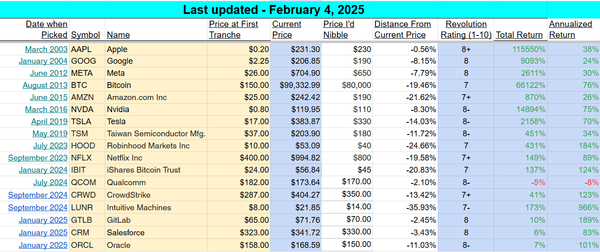Historically-speaking…
I just got this email from one of my mentors and friends from the hedge fund world, and it’s been making the rounds amongst traders today…read it and then read what I sent back to the group who received the blast email with me. Think about “flipping it” as you’re reading….why is all this so BEARISH for the stock markets? It’s not good for the broader economy and it’s certainly not fair and it’s not good for main street…but all these trends that he’s talking about are WILDLY BULLISH for the stock markets. The economy and stock markets can and do unhinge from each other for quarters, years and even nearly up to a decade at a time. Historically-speaking, at least.
No trades for me today.
Anyway, here’s the analysis from Changewave:
July 5, 2011
STOCKS MENTIONED IN THIS WEEK’S UPDATE INCLUDE: Apple (AAPL), DirecTV (DTV) and Dollar General (DG) among others.To view our current ChangeWave Portfolio Buy Lists, click here. The New Corpocracy A new earnings season is upon us and U.S. companies are expected to continue their two-year-plus trend of posting strong quarterly results. While corporate momentum is slowing a bit, the combined earnings of the S&P 500 companies are projected to rise more than 13% from a year ago for Q2.This robust performance is in stark contrast to the broader U.S. economy, which is staggering through one of the weakest recoveries since the Great Depression. The split between corporations on a roll and the overall health of the American economy raises important concerns.This dichotomy is reflected in a new report by Equilar, which was reported in the New York Times last week. It said CEO pay went up an average of 23% in 2010, while wages for everyone else rose a meager one-half-percent. The median CEO salary was $10.8 million in comparison to the $752 a week in late 2010 made by the average American worker.Another study ties these trends together. This one, by economists at Northeastern University, showed that since the recovery began in June 2009 – following a deep 18-month recession – “corporate profits captured 88% of the growth in real national income while aggregate wages and salaries accounted for only slightly more than 1%” of that growth.Between Q2 2009 and Q4 2010 national income rose by $528 billion, with $464 billion of that growth going to pretax corporate profits, while just $7 billion went to aggregate wages and salaries after inflation, according to the study. The $27 billion loss in aggregate wages and salaries during the seven quarters after the recovery began is “the first ever such decline in any post-World War II recovery.”A huge concern is about when corporations will get aggressive about hiring and capital spending. Cash is certainly not a problem. But it seems confidence is. Until monetary and fiscal policies of the U.S. are dealt with more creatively and Europe’s debt trap is alleviated, big business will not be inclined to boost investments for longer term growth.Pulling the Levers Corporations vote, so to speak, with their money. And judging by the way they are spending these days, it appears that management and boards are satisfied to sit on their nearly $1 trillion of idle cash. But they haven’t hesitated buying back shares in their companies to prop up stock prices.A report from TrimTabs says companies spent $124 billion in the first three months of the year buying up stock. During Q1, the S&P 500 Index rose more than 5%.In contrast, corporate insider buying for Q1 was uninspired. TrimTabs says insiders’ stock purchases came to less than $2 billion for the entire quarter. Not exactly a vote of confidence by the same people who have no problem tapping the corporate coffers to buy up stock.There has never been such a sharp contrast between what insiders are doing with their own money and what they’re doing with the money of the companies they manage, reports TrimTabs.Stock buybacks are usually welcomed by shareholders since they support the share price. But it is not very good if companies are borrowing billions of dollars to pump up their own stock. And, in part, that is what’s happening, according to MarketWatch.The latest Federal Reserve data shows corporate debt surging again last quarter to the highest levels on record. Debts for nonfinancial corporations hit $7.3 trillion by March 31 –up more than $100 billion since the start of the year. In comparison, the total debt at the end of 2007 – at the peak of the credit bubble – was just $6.7 trillion.The Fed says that U.S. nonfinancial corporations now have debt equal to 50% of their net worth – near record levels post-Great Depression. As recently as 2006, it was just 40%.Bargain basement interest rates are the primary driver of the explosion in corporate debt. Even cash-rich companies such as Cisco (CSCO) and Google (GOOG) are finding that these terms are too enticing to ignore and have taken the plunge. Management figures they can always find a use, whether it’s stock buybacks or acquisitions.Still, until more of this money is shifted to productive operations and capital spending and wages are boosted, it’s tough to be overly confident about accelerating and sustainable economic growth in the foreseeable future.
==
Cody here. Here’s what I wrote back to the guys on that blast email, most of whom have been bearish and hurt badly by the markets of late, unfortunately:
Changewave’s analysis sure seems BULLISH to me…tons of cash to continue funding buybacks and policies that continue to expand corporate profits. It’s not a good thing long term, but it’s a HUGELY bullish set up especially with the unprecedented monetary easing policies of the last three years (the vast majority of which continue today unabated).
The new, bigger, better/worse than ever stock market bubble is coming!
I’m serious — I don’t see how one arrives at a bearish stock market (economy is another thing) conclusion from reading the below analysis.
What would be extremely bearish? If and when the next Black Swan/crisis/socio-political-blow-up hits and these exact trends that Changewave is pointing out finally start reversing. Historically-speaking, anyway.




